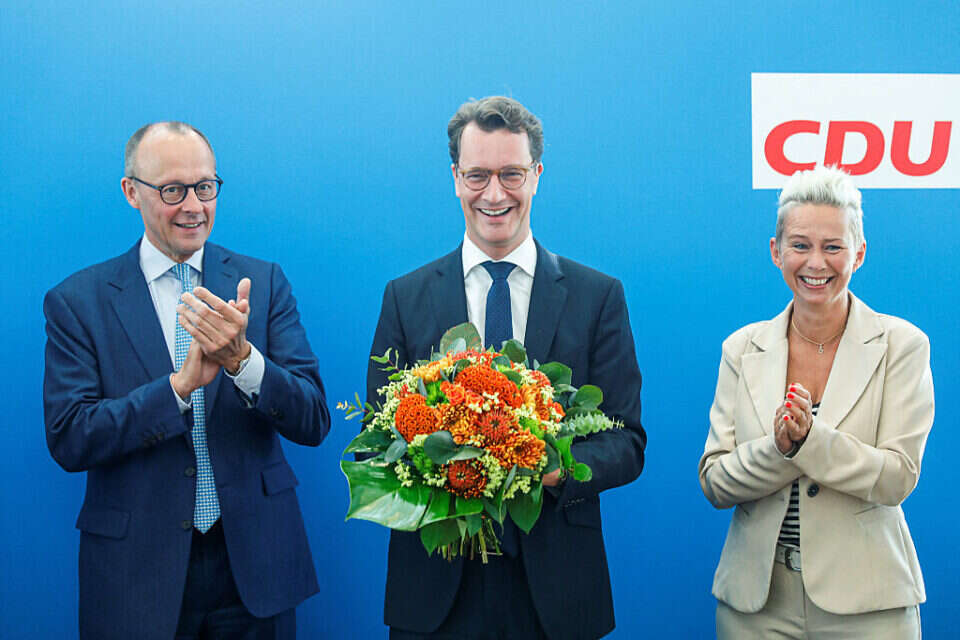Eight months after the historic collapse of the German general election last September, the blush is rapidly returning to the cheeks of the Conservatives: within two weeks they recorded the most impressive elections in two provincial states, including Germany's most populous province - Nordien-Westphalia.
In the election held there yesterday, conservative Christian Democrats won a nine percent margin over their Social Democrat rivals, who head the federal government in Berlin.
In elections a week ago in the northern district of Schleswig-Holstein, the Conservatives won a 24% margin over the ruling party.
In both cases, the Social Democrats did not benefit from the "chancellor bonus" - that is, the fact that they now lead the whole of Germany.
It is most likely that the composition of the government in Berlin and the conduct of the Chancellor, Olaf Schultz, especially on the issue of the war in Ukraine, were among the main factors in the victories of the Conservatives.
But, another main reason is the liberation of the Conservatives from the heavy and oppressive shadow of Angela Merkel and the wars of heirs that divided the party and its electorate after Merkel's decision to retire from politics.
During her 16 years in office, Merkel changed the face of her Christian Democratic party beyond recognition.
There are many, who even accused Merkel of eliminating conservatism in Germany.
Merkel, who joined the ranks of the Conservative Party from East Germany and was seen to the end as a figure who is not part of the political DNA of the Christian Democratic Party, although she managed to hold power for 16 years on behalf of this party, moved the Conservatives towards the center and left. -Democrats.
The most symbolic move for this change was Merkel's sudden decision, following the Fukushima nuclear reactor disaster, to close all nuclear reactors in Germany - a move that increased Germany's dependence on energy supplies from foreign countries, particularly Russia.
This dependence now plays a key role in Germany's dealings with Moscow in the crisis of the Ukraine war - a conduct that is perceived by Russia's critics as too hesitant.
German Chancellor, Angela Merkel // Photo: AP //,
The North Rhine-Westphalia elections are generally regarded as a test of Germany's general political sentiment.
This industrial district state has been considered in the past, especially from the 1980s onwards as a stronghold of the Social Democratic Party.
The defeat of the Social Democrats in the North Rhine-Westphalia constituency elections in 2005, following the anti-socialist reforms then adopted by the left-wing government in the labor market, paved the way for the Conservatives' narrow victory in that year's general election and Angela Merkel's arrival.
One of Merkel's successors, Amin Lasht, who was the Christian Democrats' candidate for chancellor in the last general election, served until recently, with great success, it must be said, as the prime minister of Nordain-Westphalia.
But success as a district prime minister did not help him.
He led his party to the worst election result in its history, in part because he was seen as following in Merkel's footsteps.
His successor at the top of the party, Friedrich March - who at the time was removed by Merkel from the Social Democrats' leadership and turned to business, is considered the leader of the Conservative current in the Christian-Conservative Party.
His election as party leader will allow Christian Democrats to gradually move away from the "Merkel legacy" - that is, the transformation of the main right-wing party into a center-left party that is scrambling for votes on the left.
The "March effect" was already reflected in the weakening of the populist and nationalist right-wing party, Alternative for Germany, which emerged from the conservative ranks in protest of Merkel's "betrayal" of party principles.
For the first time since its inception in 2013, the "alternative" was "blown away" by a district parliament after failing to pass the blocking percentage in Schleswig-Holstein.
The election results in North Rhine-Westphalia also indicate the weakening of the party, which is defined by the German GSS as suspected of being right-wing extremist and hostile to democracy.
A return to conservatism will allow for a further weakening of the "alternative" in the future - a party that has shaken German politics over the past decade - and may also hasten the return of conservatives to power.
Other losers in the recent district elections are the Liberals, the traditional right-wing partners of the Conservatives.
Their decision to unite with the Social Democrats and the Greens in the formation of the current federal government - in protest of Merkel's disparaging treatment of them - goes up to the Liberals by a large number.
Sooner or later they may recalculate a trajectory and bring about the overthrow of the left-wing government, as they did in the early 1980s.
Were we wrong?
Fixed!
If you found an error in the article, we'll be happy for you to share it with us














